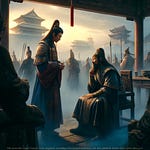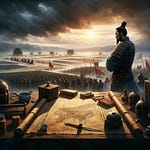Sun Tzu said: The art of war is of vital importance to the State. It is a matter of life and death, a road either to safety or to ruin. Hence it is a subject of inquiry which can on no account be neglected.
Sun Tzu wrote "The Art of War" in thirteen chapters. Initially, he aimed to help the King of Wu dominate the world by coming up with strategies. Naturally, he started by analyzing the global situation and assessing the strengths and weaknesses of various rulers. Then, he offered advice and strategies, beginning with the "Laying Plans" chapter to unfold the entire scope of warfare.
During Sun Tzu's time, language was not fully developed. Studies have shown that in the Spring and Autumn and Warring States periods, there were about 6,500 unique characters in various texts, with only around 3,000 commonly used. Now, there are over 80,000 Chinese characters. You can imagine that people back then had a lot to express but few words to use, so one character often had multiple meanings. For example, in the "Laying Plans" chapter, the character for "plan" also means to calculate and to scheme. Back then, "plan" referred to the king's pre-war efforts in the royal court to assess the situation, strengths of different parties, and predict the outcome. Today, it's akin to the strategic analysis, planning, and decision-making conducted by the top management. Therefore, to truly understand "The Art of War" , one must engage in thorough research and analysis.
Sun Tzu was against making decisions in war blindly or based on emotions. Thus, he starts with a strong call for people to take war decisions seriously. "The art of war is of vital importance to the State. It is a matter of life and death, a road either to safety or to ruin. Hence it is a subject of inquiry which can on no account be neglected." This is the first sentence of "The Art of War." It reminds us that war is a serious matter that affects the nation's survival and people's lives. We should never treat it lightly or make hasty decisions without careful consideration and in-depth research.
Sun Tzu was a materialist who, through extensive war experience, realized that war is an inevitable part of societal operation. As long as nations compete for interests, conflict will escalate to war, whether one likes it or not, and we must eventually face it. Ignoring dangers like an ostrich with its head in the sand will only lead to being overwhelmed by stronger forces. The only correct approach is to bravely confront war, face powerful enemies, and use war to stop war. Hence, he begins by clearly stating "The art of war is of vital importance to the State," viewing it as a critical issue that decides the life and death of the people and the survival of the nation.
Valuing war while also being cautious about it is the core idea expressed in the first sentence of Sun Tzu's work and a main theme throughout the book. Undoubtedly, this is a principle that must be followed in major decision-making across various fields in today's world. Whether it's decisions related to war or business, utmost caution is essential.










Share this post